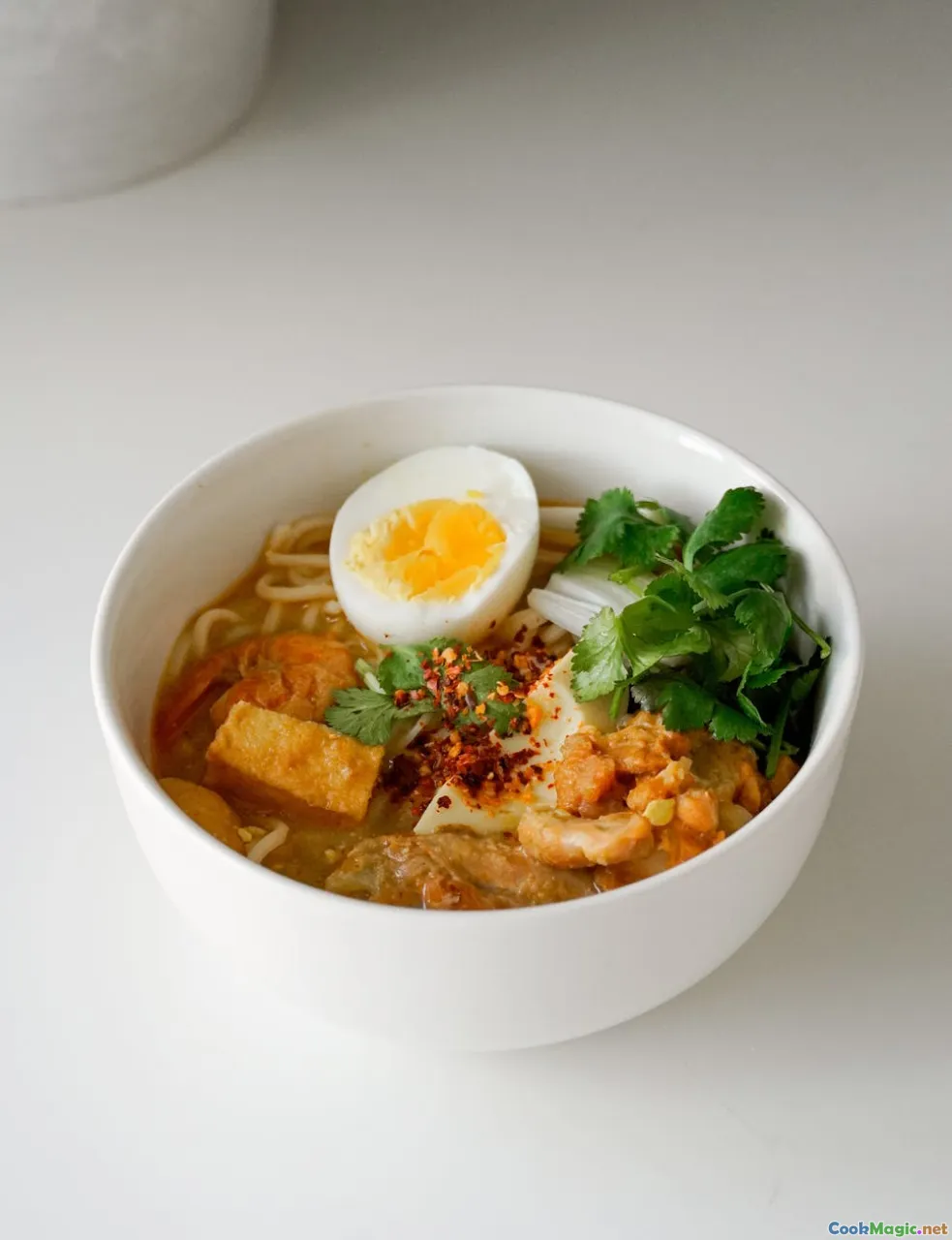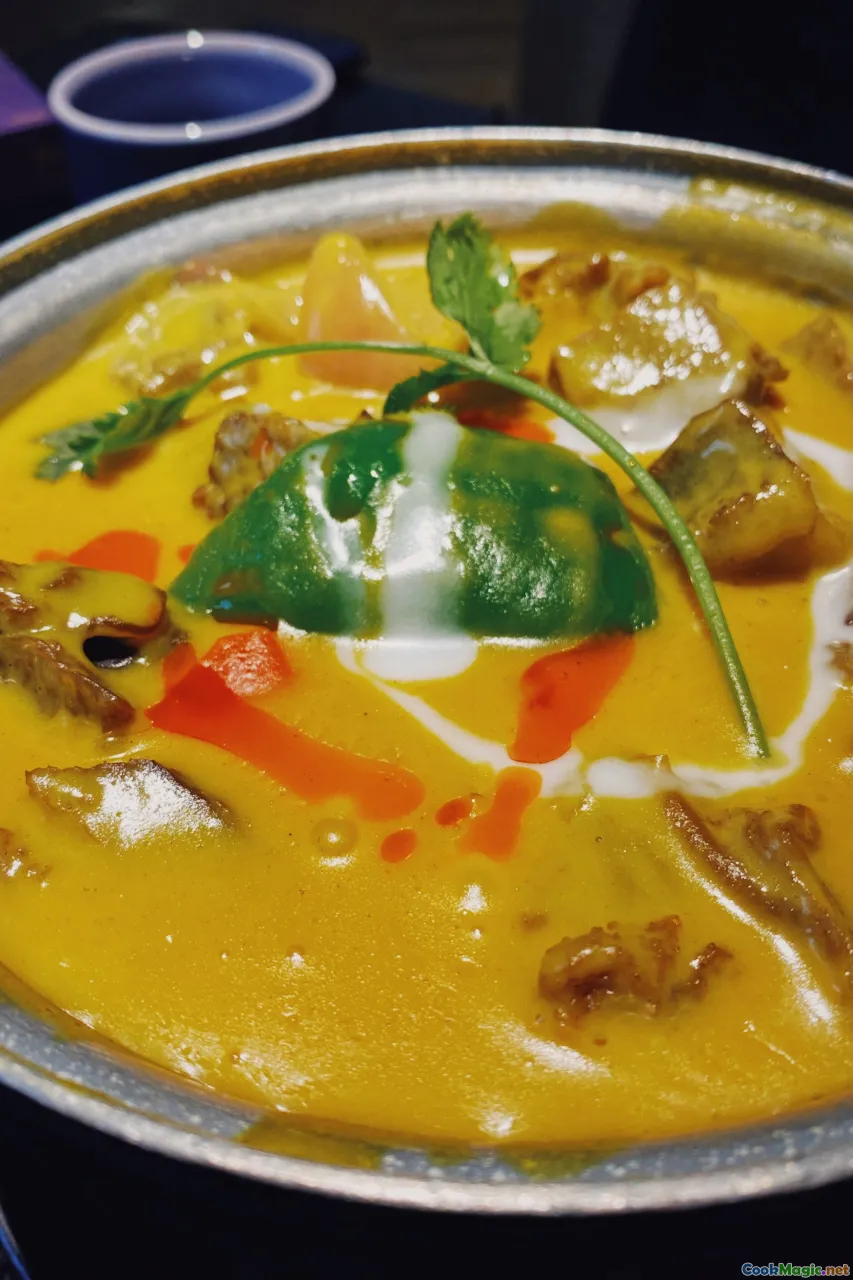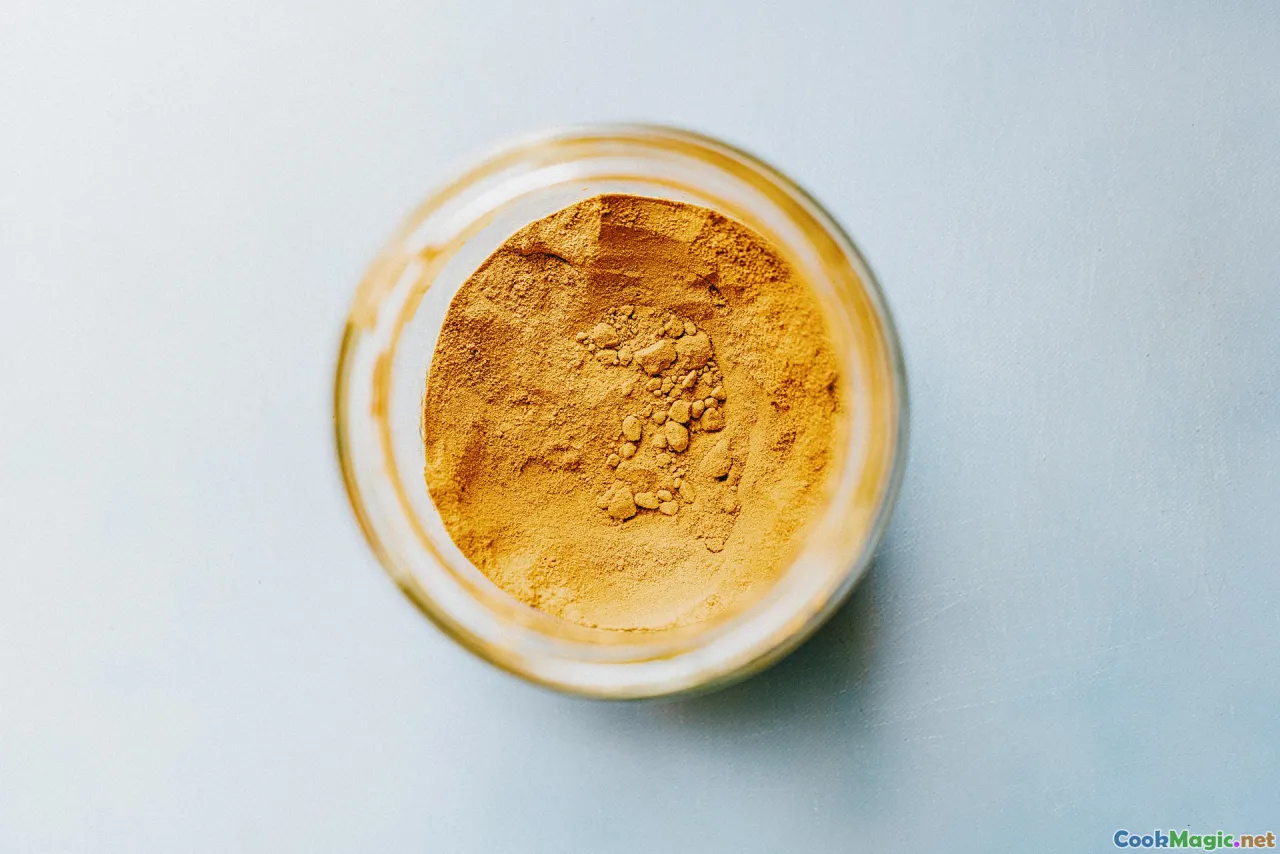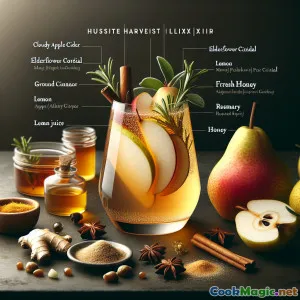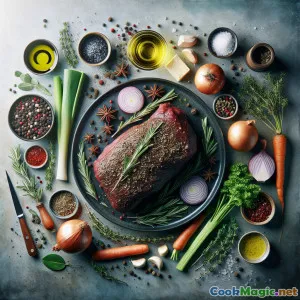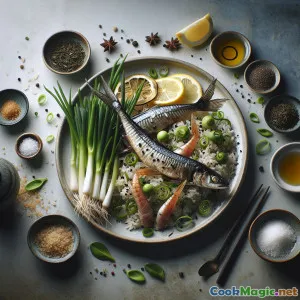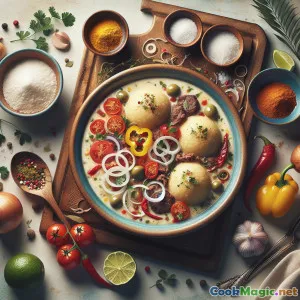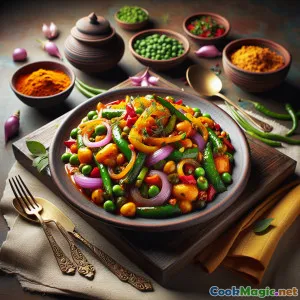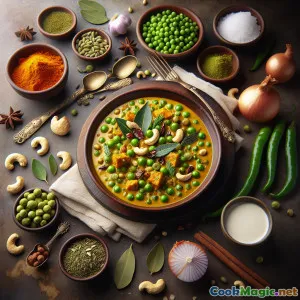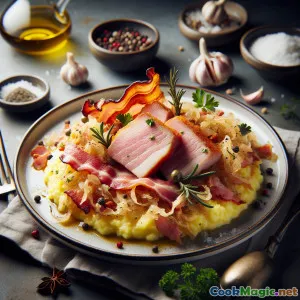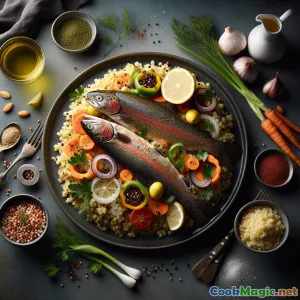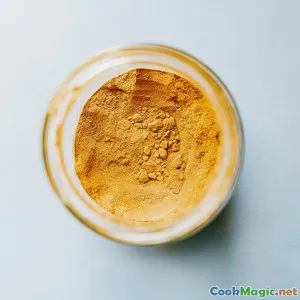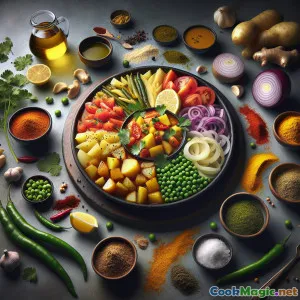
Fuzja Aloo Tama Sinki: Kwasowość i Ziemistość Zjednoczone
(Aloo Tama Sinki Fusion: Tang & Earthiness United)
(0 Recenzje)0
794
lipiec 21, 2025
Zgłoś problem
Składniki
-
400 grams Ziemniaki (aloo), obrane i pokrojone w kostkę
(Waxy varieties like Charlotte or Yukon Gold preferred)
-
100 grams Tama (fermentowane pędy bambusa), julienne
(Fresh or canned; rinse if preserved in brine)
-
50 grams Sinki (fermentowany korzeń rzodkwi)
(Traditional or substitute with kimchi for a twist)
-
100 grams Zielony groszek
(Mrożone lub świeże)
-
1 large Pomidor, pokrojony w kostkę
(Adds brightness balancing acidity)
-
1 medium Cebula, pokrojona w kostkę
-
1 tbsp Świeży imbir, posiekany
-
2 large Ząbki czosnku, posiekane
-
1/2 tsp Proszek Kurkumy
-
1 tsp Proszek kolendrowy
-
1/2 tsp Nasiona kminu
-
2 small Zielone chili, drobno posiekane
(Dostosuj do smaku)
-
2 tbsp Olej roślinny
-
2 tbsp Liście kolendry, posiekane
(Do dekoracji)
-
1 tbsp Sok cytrynowy
(Enhances tang)
Sól, to taste
-
400 ml Woda lub niskosodowy bulion warzywny
(Adjust for preferred curry consistency)
(Waxy varieties like Charlotte or Yukon Gold preferred)
(Fresh or canned; rinse if preserved in brine)
(Traditional or substitute with kimchi for a twist)
(Mrożone lub świeże)
(Adds brightness balancing acidity)
(Dostosuj do smaku)
(Do dekoracji)
(Enhances tang)
(Adjust for preferred curry consistency)
Wartości odżywcze
- Porcje: 4
- Wielkość porcji: 1 miska (250g)
- Calories: 275 kcal
- Carbohydrates: 0 g
- Protein: 6 g
- Fat: 7 g
- Fiber: 7 g
- Sugar: 5 g
- Sodium: 640 mg
- Cholesterol: 0 mg
- Calcium: 70 mg
- Iron: 1.9 mg
Instrukcje
-
1 - Prepare Aromatics:
Dice the onion, mince garlic and ginger, and chop green chilies and tomato. Peel and dice potatoes. Have all ingredients prepped before proceeding.
-
2 - Sauté Spices:
Heat oil in a deep skillet. Add cumin seeds, letting them sizzle. Toss in onion, and sauté until golden, about 3-4 minutes. Add the minced garlic, ginger, and green chilies, sautéing until aromatic.
-
3 - Build the Base:
Stir in turmeric and coriander powders. Add chopped tomato; cook down until soft and pulpy. Sprinkle in salt to draw out the tomato juices.
-
4 - Cook Potatoes:
Add diced potatoes, mixing to coat them well with the spice mix. Continue to sauté for a couple of minutes so the flavors infuse the potatoes.
-
5 - Incorporate Tama & Sinki:
Stir in tama and sinki. Mix well, letting the fermentation aroma meld with the spices.
-
6 - Simmer:
Pour in water or stock. Bring to a boil, lower heat, cover, and simmer until potatoes are just tender—about 10 minutes. Add green peas for the last two minutes.
-
7 - Finish the Curry:
Taste and adjust salt. Squeeze lemon juice in, if using. Cook uncovered until desired curry esturation is reached. Turn off heat.
-
8 - Garnish & Serve:
Garnish with fresh cilantro leaves. Serve hot with toasted bread or plain rice. Enjoy this fusion curry while warm.
Dice the onion, mince garlic and ginger, and chop green chilies and tomato. Peel and dice potatoes. Have all ingredients prepped before proceeding.
Heat oil in a deep skillet. Add cumin seeds, letting them sizzle. Toss in onion, and sauté until golden, about 3-4 minutes. Add the minced garlic, ginger, and green chilies, sautéing until aromatic.
Stir in turmeric and coriander powders. Add chopped tomato; cook down until soft and pulpy. Sprinkle in salt to draw out the tomato juices.
Add diced potatoes, mixing to coat them well with the spice mix. Continue to sauté for a couple of minutes so the flavors infuse the potatoes.
Stir in tama and sinki. Mix well, letting the fermentation aroma meld with the spices.
Pour in water or stock. Bring to a boil, lower heat, cover, and simmer until potatoes are just tender—about 10 minutes. Add green peas for the last two minutes.
Taste and adjust salt. Squeeze lemon juice in, if using. Cook uncovered until desired curry esturation is reached. Turn off heat.
Garnish with fresh cilantro leaves. Serve hot with toasted bread or plain rice. Enjoy this fusion curry while warm.
Więcej o: Fuzja Aloo Tama Sinki: Kwasowość i Ziemistość Zjednoczone
Aloo Tama Sinki Fusion: A Story of Cultures United in a Bowl
Ever wonder what might result when you take the comfort food sensibilities of English country cuisine and the tangy vegetarian pulses of Nepalese villages and combine them? 'Aloo Tama Sinki Fusion' is that imaginative result, a dish as surprising as it is supremely satisfying.
History & Tradition: Aloo means potato, a staple throughout the UK, forming the bedrock of pies, soups, and curries. "Tama" references the tendon-snapping tang of fermented bamboo shoots hailing from Nepal, used often in soups like the beloved 'Aloo Tama.' Sinki, the unsung hero, is fermented radish root, earthy and pungent, resulting from a Himalayan tradition reminiscent of sauerkraut or kimchi but uniquely its own. Both tama and sinki are ancient Nepali ferments, prized for their depth and probiotic punch.
Unique Aspects: What's special is the deliberate merging: The British potato brings creaminess and heartiness, tame in personality but reliable in texture. Added to that, tang-spiked tama and funky-piquant sinki deepen the taste while enlivening the broth with probiotics. Uniting these makes for oddly British comfort with spectacular Himalayan tang, a rare play in flavor that tickles the adventurous palate. If sinki is nowhere to be found locally, kimchi can slide into its role quite respectably, delivering that sour, lactic-charged intrigue to the bowl.
Flavor Profile: Expect layer upon layer: cumin's earthiness and coriander's citrus lift shore up the sweet-tart tomato and energetic green peas. Sharp pricks of chili work with lemon and cilantro for freshness, and well-cooked potatoes tie it all together, soaking up the fermented umami while mellowing the sharper aromas. The finished curry features a sunny golden gravy dotted with bamboo and root herbal tang—energetically bright, yet deeply nourishing.
Tips & Notes:
- Substitutions: Not everyone stocks stick-fermented sinki or Nepali tama! Kimchi, as mentioned, makes an adventurous swap for sinki, while canned bamboo in Asian groceries serves as a fine tama replacement.
- Potato Choice: Use waxy potatoes if possible, as they hold their shape and soak flavor beautifully.
- Protein Additions: Though classic is vegan, cooked chickpeas or black-eyed peas can be added for extra sustenance.
- Accompaniments: In the UK, this sits nicely next to toasty sourdough or classic crusty bread; in traditional Nepali fashion, pair with steamed rice.
- Make-Ahead: The tang from fermented veggies matures over time—the dish tastes even brighter the next day.
- Nutrition: Lending 7g plant-based fiber in every serve, it’s gut-loving and satiating. Calories sit at 275 per bowl—a nourishing yet light meal.
Cultural Significance: Nepalese and British cuisines rarely interact, but this dish celebrates shared values: making the best of pantry staples (think underrepresented vegetables, heritage preservation, creativity) and respecting flavor tangents. Both cultures know resourcefulness; both love warmth and depth. Serving this in a British kitchen on a brisk day—or during a Nepalese get-together—honors two different, thrifty, creative cuisines harmonizing effortlessly.
Personal Reflection: Cooking up this bowl stirs up the ultimate joy of fusion: The kind of gentle cultural exchange that happens not in embassy halls, but at home—over bubbling pots and expectant, curious tastebuds. This bowl, which meanders effortlessly between comfort and adventure, would be at home both on a farmhouse English table and a hillside Nepali picnic rug. The whiff of tang in the kitchen always signals something memorable and meaningful—to both the gourmand and the home cook.
==
Try making 'Aloo Tama Sinki Fusion' the very next time you crave new sensations with a backbone of tried-and-true spuds. It might just become your global staple, breaching boundaries and brightening bellies one spoonful at a time.

